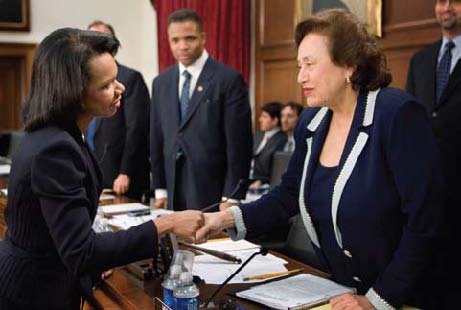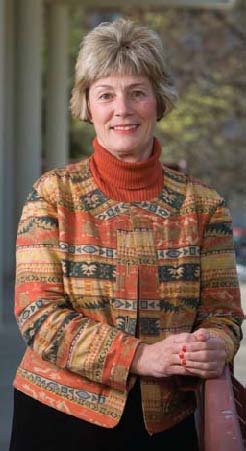Politicos
Alumnae in public office find politics frustrating, exhausting … and satisfying.

Call it an epiphany years in the making. In chapter one, Sharon Har ’90 picks up a ringing telephone after putting in a long day as a staff adviser to Hawaii’s lieutenant governor. It’s 3 a.m. and a caller pours out the story of her desperate attempts to get someone in authority to clean out a garbage-filled stream behind her house. Within days, Har has mobilized state officials to clean up the stream and fence it in. Chapter two unfolds five years later: Har is working for a law firm handling complex commercial litigation.
“I was killing myself working around the clock. I was winning cases and making money for my clients, but it wasn’t like they needed the money. There wasn’t that personal satisfaction of helping people,” says Har, recalling her 3 a.m. encounter as a “deciding moment.”
Like many Mount Holyoke alumnae serving in elective office—whose ranks include U.S. Rep. Nita Melnikoff Lowey ’59, arguably one of the most powerful Democrats in Congress—Har made the risky decision of running for office in 2006 because she thought she could make a difference in her community. Today she serves in the Hawaii House of Representatives.
Mount Holyoke alums are in the mix at all levels of government—federal, state, regional, and local—and their stories provide a vivid picture of the challenges and rewards of life in the public eye.
“Local politics is idealistic because it is an opportunity to make a difference in a community you love, and it brings out the best in people,” says Judy Harris Rawson ’70, who just stepped down after eight years as mayor of Shaker Heights, Ohio. “The glass ceiling is much thinner [in politics] than in other fields.’’
 Underscore that for Kathleen Hicks ’94, who was elected to the nonpartisan city council in Fort Worth, Texas, in 2005 after serving as an aide to her predecessor. At thirty-five and planning to seek reelection, Hicks is well versed in the challenges facing her constituents. The district of 90,000 people straddles the inner city and the suburbs and includes some of the worst streets in Fort Worth—neighborhoods that need positive economic development. The only woman and one of two African Americans on the council, she relishes the work.
Underscore that for Kathleen Hicks ’94, who was elected to the nonpartisan city council in Fort Worth, Texas, in 2005 after serving as an aide to her predecessor. At thirty-five and planning to seek reelection, Hicks is well versed in the challenges facing her constituents. The district of 90,000 people straddles the inner city and the suburbs and includes some of the worst streets in Fort Worth—neighborhoods that need positive economic development. The only woman and one of two African Americans on the council, she relishes the work.
“Sometimes I lose my battles in council … but it’s not about doing something because it is politically expedient,” says Hicks, who is also executive director of the Sickle Cell Disease Association of Tarrant County. “I am trying to get people to move beyond what they think municipal government can do—fix roads and then we’re done. We have much more of a role to play.”
As a ten-year resident of Hawaii’s 40th District, which encompasses Kapolei, the state’s “second city,” Har believed that the area’s intense development was being handled badly and that her experience as a lawyer could make a difference. She outworked the Republican incumbent by walking every corner of the district three times and stuck with the campaign even after her father was diagnosed with advanced pancreatic cancer. “There were days when I would wake up and think, ‘there is no way I can win.’ Then I would think about my father, think about my constituents, and stop feeling sorry for myself. I would get up and start walking,’’ says Har.
Now running for a second term while juggling a law practice—the $35,000 legislative salary doesn’t go far—Har’s life is scarcely her own. But there are compensations. Her father, who died in February, came twice to the flower-bedecked opening of Hawaii’s legislature; she has secured more than $300 million in infrastructure funding for her district; she has successfully promoted adoption of ignition systems that block intoxicated persons from driving; and she chaired a statewide task force on smart growth that presented five bills in the last session.
“We have such limited land in Hawaii, and preservation of open land is very, very important,” says Har. “We have one shot to get it right.”
Lowey’s path to power might be summed up this way: Start local, be persistent. As a young mother, Lowey led a PTA in Queens, New York, and that activism became the route to broader engagement with the community and politics. Lowey worked on a neighbor’s campaign—a neighbor named Mario M. Cuomo, who ultimately became New York’s governor—and served at the state level before moving to Westchester County to run for Congress. In 1988, at age fifty, Lowey survived a brutal primary and defeated a conservative Republican opponent by the smallest of margins. Twenty years later, she’s a “cardinal”—one of the dozen legislators who control the appropriations process in the U.S. House of Representatives—and her concern for expanding opportunities for women extends well beyond her district because she chairs a subcommittee that focuses on foreign aid.

“We [women] are now around the table. We are the important vote in the committee. We are the negotiator. We are the strong advocate and we have gained tremendous power,” says Lowey. “So much of the legislation that we work on would not have become law without the leadership of women, because we link our abilities and our talents to our commitment to social progress.”
“What makes the job so rewarding is that so much of the work involving individual problems can lead to remedies through Congress,” says Lowey.
Wanting to be at the table to make decisions motivates Peggy Rotundo ’71 of Lewiston, Maine. Her career in elective office began fourteen years ago with a run for school board, and she has just concluded eight years in the state Senate, four of them as chair of the joint Appropriations Committee. Term limits require her to step down, so Rotundo is running for the state House of Representatives.
“I was raised as a Quaker—you put your faith into action and work hard to create a more just world for everyone. Public service becomes another way to give back to your community and help people to improve their lives,” says Rotundo. “I want to be part of crafting good legislation for the state and making good decisions about the budget because it is the most important policy statement our legislature makes.”
So when a poor economy forced Maine to reopen its biennial budget and make additional spending cuts, Rotundo wanted to be the one managing the legislative process—even when the decisions affected programs about which she cared deeply. “It is important to have people with values, who care, making the decisions,” she says.
 Just a year behind Rotundo at Mount Holyoke, Linda Melconian ’70 was “bitten by the bug” while working for House Speaker “Tip” O’Neill, a legendary Massachusetts Democrat. First elected to the state Senate in 1982 from a district that included her native Springfield, Melconian broke through the legislative glass ceiling to become the first female majority leader in Massachusetts history. In 2002, after mounting an unsuccessful bid to come the first woman to be Senate president, she lost a bruising special-election campaign for mayor of Springfield.
Just a year behind Rotundo at Mount Holyoke, Linda Melconian ’70 was “bitten by the bug” while working for House Speaker “Tip” O’Neill, a legendary Massachusetts Democrat. First elected to the state Senate in 1982 from a district that included her native Springfield, Melconian broke through the legislative glass ceiling to become the first female majority leader in Massachusetts history. In 2002, after mounting an unsuccessful bid to come the first woman to be Senate president, she lost a bruising special-election campaign for mayor of Springfield.
“After nine years in leadership, I felt it was time to move on,” says Melconian. “I did not want to remain in the Senate as a ‘back bencher’ and allow my public-service talents to atrophy.”
Now on the faculty at Suffolk University, Melconian entered public life thanks to the legendary DC internship program created by the late MHC politics professor Victoria Schuck. Now Melconian is trying to duplicate that experience for her students. “I am passionate about making young people leaders because that is how I got my start,” she says.
Justice, writ large in a rural Virginia county, is what concerns Stephanie Murray Shortt ’91. The thirty-nine-year-old Lynchburg native ran in 2007 as an independent in predominantly Republican Floyd County—population 13,872 as of the 2000 census and covering nearly 380 square miles—after filling the office on an interim basis while her predecessor was deployed in Iraq. Shortt’s appointment as commonwealth’s attorney underwent numerous legal challenges, but she quickly earned the trust of court officers and staff, something that’s particularly important in a one-person office with responsibility for prosecuting all felony and major misdemeanor cases.
“Your job is to serve justice,” says Shortt, formerly a criminal defense attorney. “It can be really challenging because you have to exercise judgment … and if you do the job right, you will find yourself struggling [over] the right thing to do. This is a pretty powerful position; you want to make sure it is not abused and yet you feel really able to help people.”
Nearly 700 miles away, Elizabeth Scheibel ’77 has a similar balancing act as Northwestern district attorney with jurisdiction over Franklin and Hampshire counties and a staff of about 100 people. A veteran prosecutor, she was appointed the first female district attorney in Massachusetts history in 1993 and ran for election eighteen months later as a Republican.
Domestic violence and child abuse are major issues in Scheibel’s jurisdiction in western Massachusetts—rural Franklin County has some of the highest rates of both crimes in the state—and she has focused community outreach efforts in these areas, as well as on fighting abuse of the elderly and disabled. “We need to provide victims of crime who are disabled with equal access to the criminal justice system,” says Scheibel. “For the person who is nonverbal [for example], how can we push beyond the traditional means of obtaining information and move ahead with prosecution?”
Grassroots activism, coupled with firsthand experiences with crime and municipal corruption, brought Barbara Smith ’69 into the rough-and-tumble political process in Albany, New York. After buying a house in the Arbor Hill neighborhood more than twenty years ago, Smith saw the area deteriorate into a “frightening situation of ongoing violence,” but remained focused on her own work as a black feminist and scholar. That changed five years ago when she was asked to sign a petition supporting better public safety in Arbor Hill and started attending neighborhood meetings. In 2009 she will run for a second term on the Albany Common Council.
Her day-to-day goal is “to see [that] the people in my community have access to the city, to increase their sense of empowerment, and to work collectively for justice,” says Smith, who was encouraged to run by Helen R. Desfosses ’65, the first woman elected council president.
Smith’s concern about problems within Albany’s police department continues unabated. Along with five other members of the council, she’s now seeking a state investigation of a “disturbing trend of improper behavior.” Says Smith, “My politics are to the left of most people in office. I believe in people organizing from the bottom up … My joke is that now I’m part of the problem. I’m the person who’s elected.”
—By Avice Meehan ’77
Avice Meehan ’77 is vice president for communications at the Howard Hughes Medical Institute and served as press secretary to Connecticut Governor Lowell P. Weicker Jr. from 1990 to 1994. She was a founding board member of the Women’s Campaign School. This article appeared in the summer 2008 issue of the Alumnae Quarterly.
Women in Politics: Still Behind, But Gaining Ground
Women finally won the vote in 1920, yet parity at the ballot box remains a distant dream for women. It’s only been thirty-three years since Ella Tambussi Grasso ’40 became the first woman to be elected governor in her own right. When Nita Lowey Melnikoff ’59 joined the 101st Congress in 1989, she was one of twenty-six women in the U.S. House of Representatives.The numbers have increased since. California’s Nancy Pelosi made history by becoming speaker of the U.S. House of Representatives, and women hold about 16 percent of the seats in the 535-member body, according to data from the Center for Women and Politics at Rutgers University. The picture is slightly better at the state level, where women fill 23 percent of legislative seats and executive-branch offices.“Women feel like they have to get invited to the table to run, but I always say, ‘Consider this your invitation,’” says Maine’s Peggy Rotundo ’71. “Many women do not own their ambition … and hold back, and I think it’s because we don’t yet live in a world where there is an expectation that women will run.’’Many initiatives are under way to encourage women, and a comprehensive assortment of resources has been compiled by “50/50 by 2020” (www.ergd.org), an organization seeking equal representation for women by the centennial of women’s suffrage. These include the nonpartisan Women’s Campaign School at Yale (http://www.wcsyale.org/); EmergeAmerica (www.emergeamerica.org), an effort to engage Democrats; and Excellence in Public Service, which targets Republican women. (One example is at www.whitmanseries.org.)
August 31, 2008










Along with the women whom you profiled, there were others. Beverley Brown Bryant ’63 was an elected delegate to the New Hampshire Constitutional Convention in 1984 and went on to be elected to the New Hampshire House of Representatives, where she served from 1984 to l986, representing the towns of Madbury, Durham and Lee.